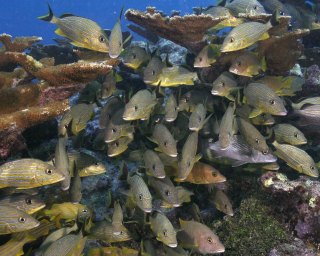Explorers: A month at the bottom of the sea

The mission commemorates the work of his famous grandfather, who won an Academy Award 50 years ago, for the documentary, “World Without Sun.” The film documented the Conshelf 2 expedition – in which humans lived and worked on the ocean floor, specifically, the continental shelf, for 30 days.
Fabien Cousteau's mission takes the challenge another step. The Conshelf mission was roughly 35 feet below the surface of the Red Sea, whereas the Aquarius Reef Base is 60 feet below.
Schoolchildren of the 1960s and ’70s knew the name Jacques Cousteau in much the same way that later generations revered Bill Nye, Science Guy. But who was Cousteau? Here are six things to know:
- Before Jacques-Yves Cousteau won worldwide fame, he was a spy. Born in 1910, Cousteau graduated from the French Naval Academy in 1930 and during World War II joined the French Resistance. He spied on Italian occupation forces, according to The New York Times. After the war, Cousteau helped clear mines from French ports.
-
A car accident gave him direction. In 1933, Cousteau broke both arms in a crash. During recovery, he started swimming to regain his strength. “In 1936, near the port of Toulon, he went swimming underwater with goggles,” according to the Cousteau Society, an organization involved in ocean research. He could see creatures beneath the waves. “It was a breath-taking revelation.”
-
He co-invented the Aqualung. After the invention of the compressed air cylinder, Cousteau and friends fashioned homemade snorkels and insulated diving suits, the Times reported. They wanted to go deeper into the ocean. Cousteau is also credited with building a protective box for his camera so he could film what he saw underwater.
- He won two Academy Awards for documentary films -- one for the 1956 film, The Silent World, and another for the 1964 film, World Without Sun. The later film, which followed the Conshelf expedition, was not without its critics. New York Times reviewer Bosley Crowther wrote that he understood that some sequences would have to be filmed in a studio. "But when Mr. Cousteau presents that incident of the saucer surfacing in the underground lake after a vastly impressive journey down the wall of the continental shelf, and even permits one of the occupants to open a topside hatch and climb half-way out, the character of the picture suddenly becomes that of a science-fiction fantasy," Crowther wrote. "And one is inclined to question whether Mr. Cousteau has not perpetrated a hoax." Cousteau defended the documentary's accuracy.
-
He never earned a scientific degree but became the only researcher that schoolchildren knew by name. “The Undersea World of Jacques Cousteau,” a series of National Geographic specials, featured fascinating ocean photography. In a 1966 deal with ABC, Cousteau was paid $4.2 million to deliver four hourlong television programs a year for three years. “In fact, the arrangement with ABC stretched over nine years,” the Times reported. Later, Cousteau made documentaries for PBS and CNN.
-
Cousteau’s famous boat, the Calypso, was formerly a mine-sweeper. Cousteau modified the 66-foot ship with instruments for scientific research. The ship was recognizable to schoolchildren of the 1970s and celebrated in the song “Calypso,” by John Denver. Struck by a barge in 1996, the Calypso sank in 16 feet of water in the Singapore harbor. The ship was subsequently returned to France, but a legal spat prevented swift restoration, according to the Cousteau Society.
Sources:
The New York Times: Jacques Cousteau, Oceans' Impresario, Dies, June 26, 1997.

